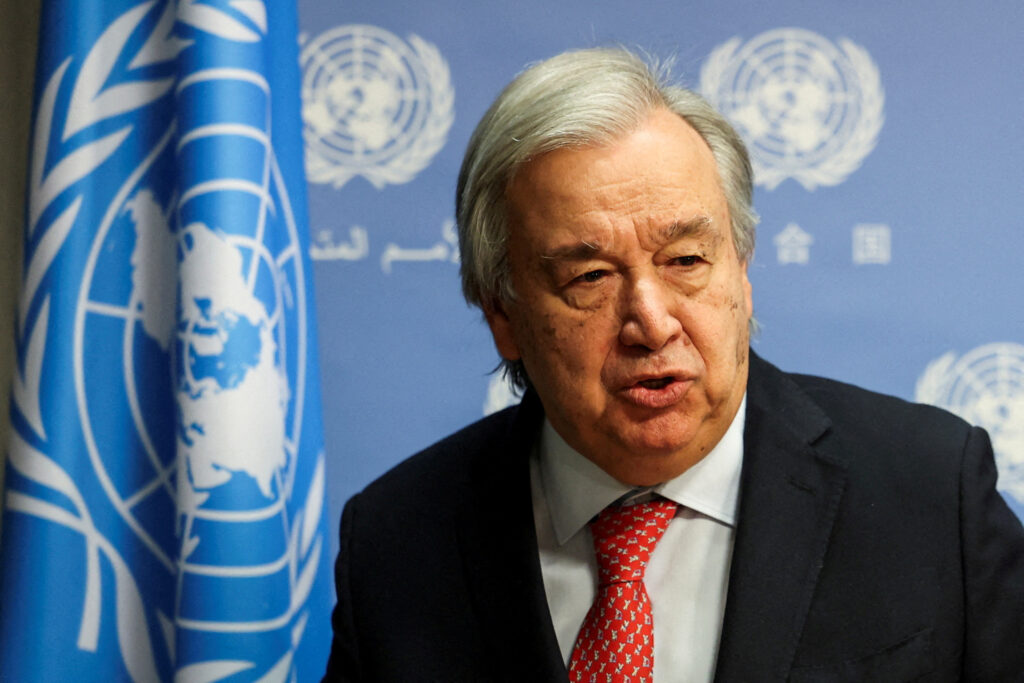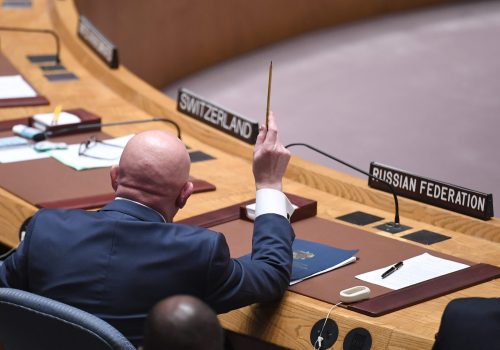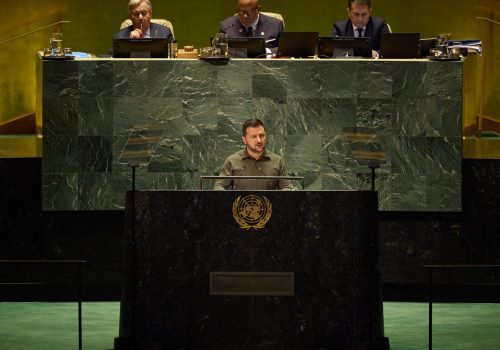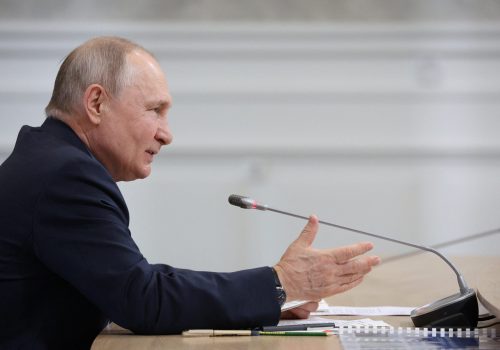Article 99 of the United Nations (UN) Charter allows the UN secretary-general to “bring to the attention of the Security Council any matter which in his opinion may threaten the maintenance of international peace and security.”
On December 6, 2023, invoking Article 99 for the first time since he took office, Secretary-General António Guterres called on the Security Council to adopt a resolution designed to put pressure on Israel to adopt a total ceasefire in Gaza to avert a humanitarian catastrophe.
Why did Guterres invoke Article 99 in the case of Gaza but not in the case of Russia’s full-scale invasion of Ukraine? The intention here is not to compare the appalling suffering endured in both cases by blameless civilians, even if it would be interesting to recall the respective causes and instigators of the two conflicts. Rather, what deserves to be compared is which of the two conflicts is more dangerous to the “maintenance of international peace and security,” which is the subject of Article 99.
The Russian nuclear threat in Ukraine
From the outset of Russia’s invasion of Ukraine, Moscow irresponsibly brandished the threat of nuclear fire to try to force Ukraine to capitulate to its demands and to dissuade NATO countries from aiding Kyiv.
Russian political scientist Sergey Karaganov, a close associate of Russian President Vladimir Putin who heads the Council for Foreign and Defense Policy, wrote on June 13, 2023: “The enemy must know that we are ready to deliver a pre-emptive strike in retaliation for all of its current and past acts of aggression in order to prevent a slide into global thermonuclear war.”
Similarly, Dmitri Trenin, a former Russian military intelligence colonel, also a member of Russia’s Council for Foreign and Defense Policy, wrote a few days later: “The possibility of using nuclear weapons during the current conflict should not be hushed up. Such a perspective, real not theoretical, should serve as an incentive to curb and stop conflict escalation and ultimately pave the way for a strategic equilibrium in Europe that suits us.”
The aim of these statements is clear: to frighten the leaders and citizens of NATO member countries into giving up their support for the Ukrainian defense and counterattack effort. Even if Putin is unlikely to risk the ramifications of using a low-yield tactical nuclear weapon in Ukraine, the potential consequences of such folly are well worth Guterres’s concern.
In addition to Moscow’s threats of nuclear strikes against Ukraine, the Russian army is occupying and using Ukraine’s Zaporizhzhia nuclear power plant for military purposes, endangering its operation.
A resolution against nuclear threats
Given the threat to global security posed by Russia’s threats to use nuclear weapons, Guterres should once again use Article 99 of the UN Charter to request that the Security Council adopt a generic, legally binding resolution under Chapter VII of the charter:
- deciding that any withdrawal from the Non-Proliferation Treaty constitutes a threat to international peace and security;
- deciding that any test of a nuclear explosive device is a threat to international peace and security;
- deciding that the use of nuclear weapons against a country that does not possess them is a crime against humanity;
- deciding that any attack on or seizure of an operating nuclear power plant for military purposes is a war crime.
The adoption by the Security Council of such a generic resolution, which would be non-discriminatory in nature, would represent a significant step forward in the fight against the proliferation of nuclear weapons.
Russia will certainly exercise its right of veto against such a resolution. Even so, putting it to a vote would at least have the merit of showing the world who is threatening international peace and security, and forcing China to clarify its position on the use of nuclear weapons.
For Guterres, the stakes are high, and he risks political retribution from Moscow. But applying the double standard of invoking Article 99 in the case of Gaza but not Ukraine would undermine his credibility.
Few things “threaten the maintenance of international peace and security” more than a potential nuclear attack. Guterres should therefore force the issue onto the Security Council’s agenda before it is too late.
We should not always have to wait for disasters to occur before moving national and international institutions toward systems more capable of guaranteeing peace between nations.
Pierre Goldschmidt is a former deputy director general of the International Atomic Energy Agency and head of the Department of Safeguards.
Further reading
Thu, Oct 12, 2023
Russia’s Ukraine invasion highlights the need for fundamental UN reform
UkraineAlert By
The full-scale Russian invasion of Ukraine has highlighted the ineffectiveness of the current international security architecture and underlined the need for fundamental reform of the United Nations, writes Paul Niland.
Wed, Sep 20, 2023
Zelenskyy tells United Nations: Russia is committing genocide in Ukraine
UkraineAlert By
Ukrainian President Volodymyr Zelenskyy told the UN this week that Russia is committing genocide in Ukraine. Efforts to legally prove genocidal intent will likely focus on the genocidal rhetoric of Putin and other Russian leaders, writes Taras Kuzio.
Wed, Jun 21, 2023
Putin’s nuclear threats will escalate as Ukraine’s counteroffensive unfolds
UkraineAlert By Diane Francis
As Ukraine's long-awaited counteroffensive gets underway, there are fears that Russia's deteriorating military predicament could lead to an escalation in Vladimir Putin's nuclear threats, writes Diane Francis.
Image: United Nations Secretary-General Antonio Guterres speaks at the United Nations before a meeting about the conflict in Gaza, at the United Nations Headquarters in New York City, U.S., November 6, 2023. REUTERS/Caitlin Ochs//File Photo



